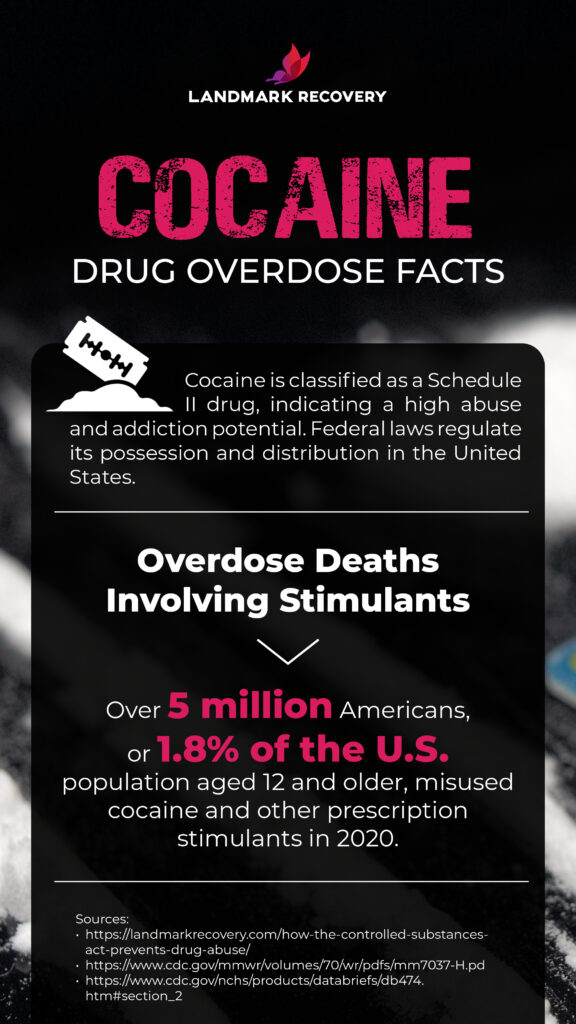A Life-Saving Guide to Symptoms, Dangers, & Recovery Options
Can you overdose on cocaine? The answer is undoubtedly yes. Cocaine, a powerful and addictive stimulant, has been responsible for numerous tragedies and health crises. The drug’s ability to quickly overload the body’s systems can lead to a fatal overdose, even if used in small amounts.
Key blog points to remember:
- Cocaine overdose is possible and common, leading to tens of thousands of deaths in the U.S.
- Overdose symptoms can have long-term mental and physical consequences, including anxiety, tremors, high blood pressure, and heart failure.
The Alarming Statistics
The alarming rise in cocaine-related deaths is a clear and present danger. According to the CDC WONDER, drug overdose deaths involving stimulants like cocaine increased to 32,537 in 2021 in the United States. This startling figure shows how important understanding cocaine-associated risks and recognizing the signs of an overdose is.
A Real-World Overdose Story
One life that this tragic fate claimed was Ray Lewis III, the son of NFL Hall of Famer Ray Lewis. Recently, he died of a drug overdose from a deadly mixture that included cocaine. Lewis’s story is a heartbreaking reminder that cocaine addiction can affect anyone, regardless of background or status.
It’s Time to Take Action
With the danger real and present, it’s time to explore the complex world of cocaine addiction, overdose symptoms, long-term consequences, and recovery options available. Let’s dive into the facts and equip ourselves with the knowledge needed to combat this ongoing crisis.
What is Cocaine? Understanding the Basics
Cocaine is a stimulant drug derived from the coca plant. It’s known for its euphoric effects and can be snorted, smoked, or injected. These methods deliver the drug rapidly into the bloodstream, leading to an intense but short-lived high.
The intense sensation of pleasure often leads to a strong desire for more, putting users at risk of addiction. Cocaine’s addictive properties stem from its ability to flood the brain with dopamine, a neurotransmitter associated with pleasure and reward. The strain cocaine places on organ tissue in the body make it particularly dangerous when used often in high amounts.
Why is it so addictive?
Cocaine’s addictive nature can be attributed to several factors, leading to its classification as a Schedule II drug under the Controlled Substances Act. This means that cocaine has recognized narrow medical uses but also carries a high risk of abuse and addiction.
The availability of cocaine in various forms, such as powder or crack, adds to its widespread abuse. The rapid high followed by an intense crash creates a vicious cycle of rapid dosing to continue flooding the brain with dopamine. This makes quitting a daunting task. At Landmark Recovery, we understand the allure of cocaine and its dangers.
Our team of medical experts is dedicated to partnering with those struggling with addiction to find the path to recovery. We offer drug treatment programs providing support and recovery tools to break free from this dangerous cycle, focusing on customized care tailored to specific patient needs.
Call 888-448-0302 to speak to a Patient Navigator today if you or a loved one struggle with cocaine.
Cocaine Overdose Quick Facts Infographic
Panel 1
Cocaine is classified as a Schedule II drug, indicating a high abuse and addiction potential. Federal laws regulate its possession and distribution in the United States.
Panel 2
Over 5 million Americans, or 1.8% of the U.S. population aged 12 and older, misused cocaine and other prescription stimulants in 2020.
What Causes Cocaine Overdose?
Power and Purity
Cocaine’s potency and purity can significantly affect the risk of overdose. Higher purity levels can have a more substantial drug effect. Even a slight increase in dosage can lead to life-threatening consequences.
Mixing it With Other Substances
Cocaine is often mixed with other substances, like opioids, leading to a dangerous and sometimes fatal combination. In 2021, over 78% of cocaine-related drug overdose deaths involved opioids, the CDC found. These statistics shed light on the alarming trend of mixing drugs, further elevating the risks.
Individual Tolerance and Health Factors
People’s cocaine tolerance is unique, and underlying health conditions can significantly influence overdose risk. Factors like heart conditions, respiratory issues, and previous drug history can make you more likely to experience an overdose. For those reasons, personalized drug treatment at Landmark Recovery considers these unique factors, creating a recovery that honors each person’s journey.
Symptoms of Cocaine Overdose
The signs may vary but often include:
- Severe Chest Pain: Cocaine can cause blood vessels to tighten, leading to chest pain and potential heart attacks.
- Trouble Breathing: Respiratory failure is a common symptom of cocaine overdose, requiring immediate medical attention.
- Increased Temperature and Sweating: Overdose can lead to hyperthermia, a dangerous increase in body temperature.
- Seizures and Tremors: Uncontrolled muscle movements and seizures are alarming signs of a potential overdose.
- Psychological Symptoms: Mental signs like extreme agitation, paranoia, or hallucinations may signal an overdose.
Landmark Recovery’s experienced clinical team is trained to recognize and address these symptoms, offering compassionate medical care and specialized treatment to those struggling with cocaine addiction.
Dangers of Cocaine Overdose
The immediate consequences of a cocaine overdose can be frightening, but long-term effects can persist and create lifelong challenges. From brain damage to cardiovascular problems, the aftermath of an overdose can be a constant struggle. Families are often left devastated, searching for answers and ways to help their loved ones.
Long-Term Consequences
Chronic cocaine use can lead to severe health issues, like:
- Respiratory failure
- Stroke
- Gastrointestinal complications
Cocaine overdose survivors may even suffer from lasting damage that impacts daily living.
Treatment Options for Cocaine Overdose: A Path to Recovery
Immediate Medical Intervention
Speedy medical intervention can be life-saving if you or someone you care about experiences a cocaine overdose. Hospitals and emergency medical services have the necessary equipment and medication to stabilize patients, but time is of the essence. Recognizing the signs and seeking help without delay is crucial.
Drug Detox and Residential Treatment
Detoxification is usually the first step in the recovery process, followed by residential treatment. Landmark Recovery offers a comprehensive drug detox program, helping patients safely withdraw from cocaine. Residential treatment then provides the structure and support needed for long-term success.
Outpatient Drug Rehab and Aftercare
For those who have completed detox and residential treatment, outpatient drug rehab and aftercare are vital. These programs allow you to continue your recovery journey while maintaining daily routines. Landmark Recovery’s intensive outpatient program offers flexibility with the same commitment to excellence and care.
Can You Overdose on Cocaine?
Yes, you can overdose on cocaine. The dangers are real, and the consequences can be fatal.
The Statistics Speak
Cocaine overdose has led to thousands of deaths in the U.S. alone. It’s not a risk to take lightly.
Treatment Options: There’s Hope
If you or someone you care about struggles with cocaine addiction, help is available at Landmark Recovery. Our drug treatment programs include:
- Inpatient rehab
- Medical detox
- Outpatient rehab
- Aftercare
Partner With Landmark Recovery Nationwide to Conquer Addiction
Landmark Recovery’s drug rehab centers are available in the following states:
Don’t Wait: Your Life Is Worth It
Call our confidential admissions line at 888-448-0302 today. Our Patient Navigators are available 24/7/365. Remember, the right support can make all the difference.
Cocaine Related Reads
For more in-depth information and resources about cocaine addiction and recovery, please explore the following articles:
- What Is The Cocaine High and How Does it Feel?
- The Dangers of Cocaine Withdrawal
- Rising Deaths from Mixing Cocaine with Opioids
- How Long Does Cocaine Stay in Your System?
- The Effects of Cocaine
- Signs of Overdose: Opioids | Cocaine | Heroin | Meth
- How To Come Down From Cocaine
- How to Get Cocaine Out of Your System

Choose Recovery Over Addiction
We're here 24/7 to help you get the care you need to live life on your terms, without drugs or alcohol. Talk to our recovery specialists today and learn about our integrated treatment programs.





